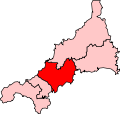Truro and St Austell (UK Parliament constituency)
Coordinates: 50°18′58″N 4°54′54″W / 50.316°N 4.915°W
| Truro and St Austell | |
|---|---|
|
Former County constituency for the House of Commons | |
|
Boundary of Truro and St Austell in Cornwall for the 2005 general election. | |
|
Location of Cornwall within England. | |
| County | Cornwall |
| Major settlements | Truro and St Austell |
| 1997–2010 | |
| Number of members | One |
| Replaced by | Truro and Falmouth, St Austell and Newquay |
| Created from | Truro |
Truro and St Austell was a county constituency represented in the House of Commons of the Parliament of the United Kingdom. It elected one Member of Parliament (MP) by the first past the post system of election.
Boundaries
The District of Carrick wards of Boscawen, Chacewater, Feock, Kea, Kenwyn, Moresk, Newlyn, Perranzabuloe, Probus, Roseland, St Agnes, St Clement, Tregolls, and Trehaverne, and the Borough of Restormel wards of Crinnis, Mevagissey, Poltair, Rock, St Ewe, St Mewan, St Stephen-in-Brannel, Trevarna, and Treverbyn.
The constituency was centred on the former district of Carrick, which contains the city of Truro, and the former borough of Restormel which contains the town of St Austell.
Boundary review
Following their review of parliamentary representation in Cornwall, the Boundary Commission for England created an extra seat for the county which meant consequential changes for the existing seats. Truro and St Austell was abolished, and was partly succeeded by St Austell and Newquay.
The city of Truro forms part of the newly created Truro and Falmouth constituency.
History
The constituency has existed in a number of different forms. The Truro constituency, up until 1885 elected two members to parliament; this was reduced to one. In 1918 the constituency was abolished but it was recreated again in 1950.
In 1997, in spite of the fact that no boundary changes were made to Truro on that occasion, the Boundary Commission nonetheless saw fit to change its name to Truro and St. Austell, reflecting the fact that St Austell has a larger population than Truro. The Truro seat became a safe Liberal seat due to the popularity of its former MP, David Penhaligon. He died in a car crash in 1986, aged 42 and was succeeded at a by-election the following year by Matthew Taylor, who held the seat comfortably until his retirement, and the constituency's abolition, in 2010.
Members of Parliament
| Election | Member[1] | Party | |
|---|---|---|---|
| 1997 | Matthew Taylor | Liberal Democrat | |
| 2010 | constituency abolished: see Truro and Falmouth and St Austell and Newquay | ||
Elections
Elections in the 2000s
| Party | Candidate | Votes | % | ± | |
|---|---|---|---|---|---|
| Liberal Democrat | Matthew Taylor | 24,089 | 46.7 | -1.6 | |
| Conservative | Fiona Kemp | 16,686 | 32.4 | +0.1 | |
| Labour | Charlotte Mackenzie | 6,991 | 13.6 | -0.1 | |
| UKIP | David Noakes | 2,736 | 5.3 | +2.0 | |
| Mebyon Kernow | Conan Jenkin | 1,062 | 2.1 | -0.2 | |
| Majority | 7,403 | 14.4 | |||
| Turnout | 51,564 | 64.2 | 0.7 | ||
| Liberal Democrat hold | Swing | -0.8 | |||
| Party | Candidate | Votes | % | ± | |
|---|---|---|---|---|---|
| Liberal Democrat | Matthew Taylor | 24,296 | 48.3 | -0.2 | |
| Conservative | Timothy Bonner | 16,231 | 32.3 | +5.8 | |
| Labour | David Phillips | 6,889 | 13.7 | -1.6 | |
| UKIP | James Wonnacott | 1,664 | 3.3 | +2.3 | |
| Mebyon Kernow | Conan Jenkin | 1,137 | 2.3 | +1.5 | |
| Independent | John Lee | 78 | 0.2 | -0.3 | |
| Majority | 8,065 | 16.0 | |||
| Turnout | 50,295 | 63.5 | -10.6 | ||
| Liberal Democrat hold | Swing | -3.0 | |||
Elections in the 1990s
| Party | Candidate | Votes | % | ± | |
|---|---|---|---|---|---|
| Liberal Democrat | Matthew Taylor | 27,502 | 48.5 | -2.0 | |
| Conservative | Neil Badcock | 15,001 | 26.4 | -11.9 | |
| Labour | Michael Dooley | 8,697 | 15.3 | +5.5 | |
| Referendum | Carl Hearn | 3,682 | 6.5 | ||
| UKIP | Alan Haithwaite | 576 | 1.0 | ||
| Green | Dorienne Robinson | 482 | 0.8 | -0.1 | |
| Mebyon Kernow | Davyth Hicks | 450 | 0.8 | ||
| Independent | Lorna Yelland | 240 | 0.4 | ||
| Natural Law | Peter Bolland | 117 | 0.2 | +0.0 | |
| Majority | 12,501 | 22.0 | +9.8 | ||
| Turnout | 56,747 | 74.0 | -8.3 | ||
| Liberal Democrat win (new seat) | |||||
For elections before 1997, see Truro
See also
Notes and references
- ↑ Leigh Rayment's Historical List of MPs – Constituencies beginning with "T" (part 2)
- ↑ "Election Data 2005". Electoral Calculus. Archived from the original on 15 October 2011. Retrieved 18 October 2015.
- ↑ "Election Data 2001". Electoral Calculus. Archived from the original on 15 October 2011. Retrieved 18 October 2015.
- ↑ "Election Data 1997". Electoral Calculus. Archived from the original on 15 October 2011. Retrieved 18 October 2015.
Sources
- Robert Beatson, A Chronological Register of Both Houses of Parliament (London: Longman, Hurst, Res & Orme, 1807)

